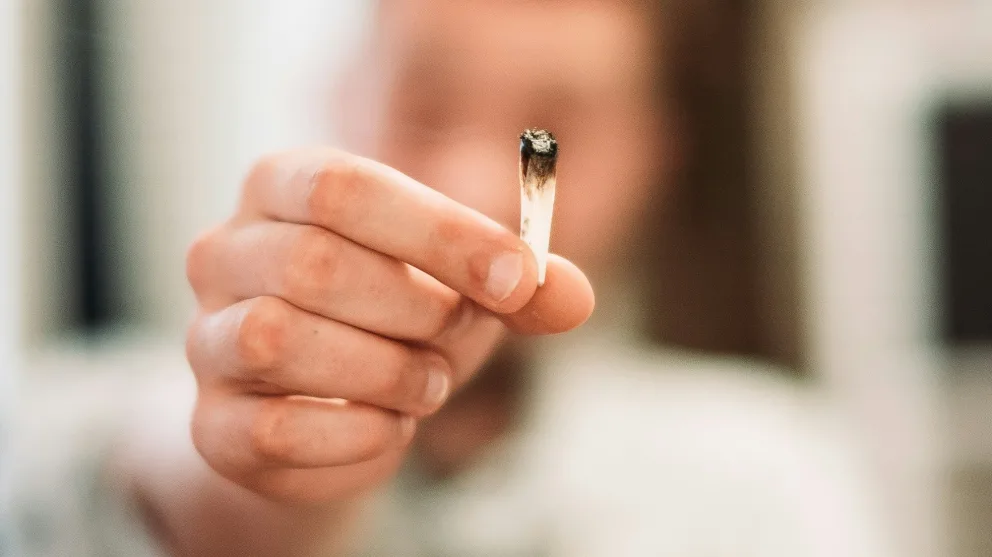How Long Does Weed Withdrawal Last & What are the Symptoms?

Photo by GRAS GRÜN
Cannabis is proving to be a boon to both medicine and the economy. Still, oftentimes, even things that are beneficial can end up getting abused. Cannabis does offer a physical high and potential distraction which can lead to bad habits, namely addiction.
People can develop an unhealthy dependency on things that take them out of their everyday experience including everything from sugar, caffeine, cigarettes to even heavy drugs. But is weed physically addictive? Can you become physically dependent on cannabis? How long might weed withdrawal last and what does it look like?
While there are countless medical benefits to using cannabis to help treat various symptoms and conditions, excessive marijuana use, especially when used irresponsibly, can potentially lead to a use disorder. Like an addiction it’s a series of unhealthy habits.
While cannabis is not toxic and there is no potential for a lethal overdose there are negative side effects to overusing cannabis. These physiological side effects can take time to right themselves. This post will cover the ins and outs of cannabis addiction, explore weed withdrawal and provide some strategies for stopping a dependency on cannabis.
Apply for a Medical Marijuana Card Online Today
Join over 100,000 patients who have chosen Green Health Docs as their medical cannabis doctors. We have a 99% approval rate and offer a 100% money back guarantee!
Can You Be Addicted To Weed?
Yes, you can become addicted to cannabis. You may not become chemically dependent on cannabis like you may become with other drugs like cocaine, heroin, meth, or even alcohol. If you suffer from persistent cravings and compulsive use despite weed having negative impacts on your life this might signal you have a weed addiction.
According to the Centers for Disease Control and Prevention (CDC), about 3 in 10 cannabis users can develop a substance use disorder. The use of cannabis comes with a 10% chance of developing an addiction. Teens who start using cannabis before 18 years old are up to 7 times more likely to develop a use disorder.
Substance use disorder is synonymous with addiction but unlike some substances that are likely to cause a physical dependency ranging from heavy drugs to caffeine your body will not develop a dependency on cannabis. In the same way someone might become addicted to sex or food your relationship with cannabis can become unhealthy. While, heavy alcohol or drug use can create a literal chemical dependency where your body needs it to function.
A Washington study in 2021 found that more than one-third of men surveyed in all age groups reported using cannabis daily, and more than 40% of those over 65. Nearly one-third of female cannabis users ages 50–64 and one-fifth of women ages over 65 use cannabis daily.

Photo by RDNE Stock Project
What Can Too Much Weed Do To You?
Again, while you cannot develop a physical dependence on cannabis there are still negative impacts to heavy or regular cannabis use. Cannabis, specifically cannabinoids, connect with the endocannabinoid system that manages various vital body functions ranging from hunger to inflammation.
When consuming cannabis, whether medically or recreationally, it’s important to take tolerance breaks. If you’ve ever used cannabis regularly and found that you need to consume more THC to feel high it’s likely you need to take a break to let your tolerance reach more baseline levels.
One reason for this effect is that heavy cannabis use can decrease the number of CB1 receptors of your endocannabinoid system. This decrease in CB1 receptors can negatively impact memory, and cognition. Studies have also found that excessive cannabis use has been tied to shrinkage of the hippocampus. This is the part of the brain that governs learning and memory.
Luckily, taking time to abstain from cannabis use can reverse many of these negative effects unlike negative effects of other drugs or substances like alcohol. Your body will naturally replenish CB1 receptors after taking a significant time away from cannabis.
Can You Overdose On Marijuana?
You can overdose on marijuana but it is not the same as an overdose of drugs. An overdose of drugs can be potentially lethal and put your health at risk. A marijuana overdose is more an excessive amount of THC in the bloodstream that can be more unpleasant and unsettling than particularly dangerous.
The signs of a cannabis overdose include:
- Anxiety
- Panic Attacks
- Paranoia
- Rapid Heartbeat
- Nausea
- Vomiting
- Visual or Auditory Hallucinations
- Seizures (In Severe Cases)
A marijuana overdose is often possible when someone consumes more THC than normal from a potent strain or high THC products like moon rocks or from unknowingly consuming edibles and being ill-prepared for the high.
More often than not the symptoms of an overdose are exacerbated by anxiety and panic. While your heart can beat faster, a marijuana overdose is only likely an issue if you have a heart condition or if you have a history of mental illness like schizophrenia. In those cases, those underlying issues are the causes of any major issues.
Also, if you ever end up getting too high one important factor is to relax and make sure to regulate your breathing. You can also use terpenes like pinene or the cannabinoid CBD to help mitigate the THC.
Chewing peppercorns, while also unpleasant, can help you get an instant influx of pinene to help you when you’ve consumed too much THC.
Benefits Of Quitting Weed
While cannabis has a myriad of benefits and untapped potential for treating various conditions and illnesses, if you are struggling with an addiction quitting marijuana use can be highly beneficial.
Quitting weed can lead to improved motivation, memory, and concentration. It can also help you address what you might be running from with excessive cannabis use. Oftentimes, you can miss out on your full potential by using substances to seek comfort or escape reality rather than dealing with any major issues in your life.
Quitting weed can also help your mental health. A study led by researchers at the Mental Health Services in the Capital Region of Denmark and the National Institute on Drug Abuse (NIDA) found a statistically significant connection between excessive cannabis use and schizophrenia.
The study found that 30% of the cases of schizophrenia among men aged 21-30 may have been avoided if those patients did not have a marijuana addiction. There has also been research into cannabis psychosis which is a schizophrenia-like condition that results from excessive cannabis use.
If you smoke weed, quitting cannabis can help you mitigate any health risks. If you overindulge in the munchies, stopping cannabis use can help you more readily manage your diet.
One obvious benefit to quitting cannabis use can also help you save money. Like with any addiction including alcoholism, you can save a significant amount of money that you can devote to other aspects of your life.

Photo by Pavel Danilyuk
How Long Does it Take To Get Weed Out Of Your System?
More often than not people are concerned with cannabis in your system as it relates to drug tests. About 65% of cannabis leaves your body in your fecal matter and 20% in your urine.
The half-life of THC, the amount of time it takes for half of it to leave your system, is approximately 1.3 days. For heavy users, it can be anywhere from 5-13 days. For more check out this post.
Cannabis is completely undetectable in the body after about 90 days. 3 months is a good barometer because by then it will not be in your system. However, this can vary from person to person.
Most of the compounds in cannabis like THC are fat-soluble. This means that they can, in some cases, become stored in fat tissue and occasionally get metabolized later. This is important to be mindful of if you are trying to detox from THC.
How Long Does It Take To Quit Weed?
This question is complex because it can take anywhere from 3 weeks to a lifetime to quit a substance you are addicted to. Again, cannabis addiction can often be more tied to other factors like anxiety, depression, unprocessed trauma, or bad habits.
The bulk of any withdrawal symptoms can taper off in about three weeks. Additionally, it can take about three months to fully eliminate any cannabis remnants from your body so a general timeline might be between 3 weeks to a little over three months to fully be clear of cannabis and any potential physiological effects.
However, it may take longer to address the underlying issues that caused your cannabis addiction. Again, cannabis is not likely to cause a physical dependency and isn’t as addictive as heavy drugs or even nicotine.
In order to support your recovery you may want to seek out support either medically or from a recovery program to address the psychological addictive tendencies which you can only address on your own.
When quitting a substance there are two things to consider. First is the withdrawal symptoms which often resolve over time as your body adjusts to not habitually using the substance. The other is emotional or personal in nature.
Let’s dive deeper and explore the full experience of withdrawal.
When Do Weed Withdrawals Start?
Quitting cannabis can be scary at first. Any choice to quit anything from alcohol to sugar can be met with resistance, withdrawal, and a flood of emotions. Usually any withdrawal symptoms will begin within the first 72 hours. The peak of withdrawal often occurs within the first 2-6 days and any lingering symptoms can resolve within three weeks.

Photo by Andrew Neel
What Are Common Weed Withdrawal Symptoms?
People’s body chemistry can vary but many of the reported symptoms of cannabis withdrawal can include:
- Decreased Appetite
- Mood Swings
- Irritability
- Trouble Sleeping/Insomnia
- Inconsistent Sleep
- Headaches
- Loss of Focus
- Cravings for Cannabis
- Sweating, Including Cold Sweats
- Chills
- Increased Feelings of Depression
- Increased Feelings of Anxiety
- Stomach Problems
- Abdominal Pain
- Shakiness
How Long Does Weed Withdrawal Last?
According to a 2020 study, the prevalence of cannabis withdrawal syndrome is only about 47% so there is a chance you may not even suffer from any physical symptoms. However, if you use cannabis to help you sleep or deal with anxiety or depression these conditions may worsen over the course of your withdrawal period.
Again, your relationship with cannabis can vary and you may even have unprocessed cannabis compounds stored in your body fat. This means that your withdrawal may last on average about three weeks or longer if you’re an excessive cannabis user.
How To Stop Smoking Weed Cold Turkey?
Luckily, cannabis does not make one physically or chemically dependent so there’s no risk to quitting cold turkey. Even alcoholics who try to quit drinking may need to seek medical help and support to quit cold turkey. Additionally, as mentioned, not everyone faces cannabis withdrawal.
If you do decide to quit cold turkey you’ll want to establish healthy habits to help replace cannabis use. Consider finding relaxation techniques like deep breathing, meditation, or yoga when you feel compelled to smoke as they can help provide the same desired effect.
Physical activity and exercise can not only increase your endorphins but also address any unprocessed cannabis byproducts lingering in your body fat.
You can also seek out support in the form of 12-step groups, group or solo therapy to address not just the emotions that arise but help provide a support system as you seek sobriety from cannabis.

Photo by Tima Miroshnichenko
How To Sober Up From Weed If You’re Struggling To Quit
Quitting any substance can be a challenge. After all, while many substances are inherently addictive, what drives people to use, and overuse, is often unresolved mental and emotional struggles they may be avoiding.
While cannabis may not seem on-par with cocaine or heroin use if you are struggling you may want to seek out rehab. Here are other helpful resources to consider:
- The Substance Abuse and Mental Health Services Administration (SAMHSA) is a national organization that provides many resources for people struggling with addiction. Their national helpline number is 1-800-662-4357.
- Marijuana Anonymous is a 12-step program similar to AA but focused specifically on people struggling with cannabis dependency.
- Recovery Dharma offers a Buddhist and trauma-informed approach to recovering from addiction. To those deterred by 12-step’s religious stance this may be a program to help you with approaching addiction.
Final Thoughts
While medical marijuana is proving to have great results, like opiates, if it is addictive to you it may not be helpful in your healing. There are other alternative treatments you may want to seek out if you personally have a problem with cannabis.
Addiction is serious business but luckily you have the power to address it. Often, addressing the underlying issues with therapy and the help of a professional can help you address any tendency towards habitual or addictive uses of a substance.
People can often become addicted to caffeine, sugar, nicotine and alcohol so while cannabis becomes more common it’s important to ensure that you have a healthy relationship that serves you and your physical and emotional health.
 This article has been reviewed by Dr. Anand Dugar, an anesthesiologist, pain medicine physician and the founder of Green Health Docs. Graduating from medical school in 2004 and residency in 2008, Dr. Dugar has been a licensed physician for almost 20 years and has been leading the push for medical cannabis nationwide.
This article has been reviewed by Dr. Anand Dugar, an anesthesiologist, pain medicine physician and the founder of Green Health Docs. Graduating from medical school in 2004 and residency in 2008, Dr. Dugar has been a licensed physician for almost 20 years and has been leading the push for medical cannabis nationwide.



